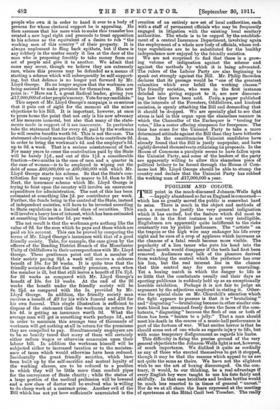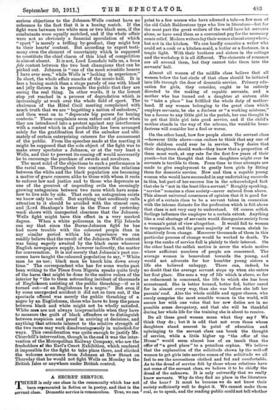PUGILISM AND COLOUR.
THEpoint in the much-discussed Johnson-Wells fight —happily abandoned so far as England is concerned— which has so greatly moved the public is somewhat hard to seize. There is much in the object and methods of such a contest to justify the very general indignation which it has excited, but the feature which did most to arouse it in the first instance is not very intelligible. Englishmen are apparently quite indifferent to the risks constantly run by public performers. The " artiste " on the trapeze or the high wire may endanger his life every night and be sure of a crop of applause which increases as the chances of a fatal result become more visible. The popularity of a lion tamer who puts his head into the animal's month would disappear if the teeth had first been removed. Audiences may talk of the pleasure derived from watching the control which the performer has over his lion, but the real interest lies in the chance that this control may for once prove unavailing. Yet a boxing match in which the danger to life is so little that the combatants usually end their days as sporting publicans is suddenly held up as an exceptionally horrible exhibition. Perhaps it is not fair to judge an argument by the adjectives employed in stating it. Other- wise the special claim on Mr. Churchill's attention which the fight appears to possess is that it is " brutalizing " and " disgusting "—brutalizing because in other similar con- tests blood has streamed freely down the faces of the com- batants, " disgusting " because the flesh of one or both of them has been " beaten to a jelly." That a man should meet his death in the course of a music-hall performance is part of the fortune of war. What excites horror is that he should come out of one whole as regards injury to life, but with some temporary disfigurement as regards his limbs.
This difficulty in fixing the precise ground of the very general objection to the Johnson-Wells fight is not, however, of much importance. We disliked it quite as cordially as any of those who exerted themselves to get it stopped, though it may be that the reasons which appeal to us are not quite the same as theirs. We have not the slightest wish to see the art of boxing discouraged. On the con- trary, it would, to our thinking, be a real advantage if every English boy were taught to use his fists fairly and skilfully. In that case brickbats and broken bottles would be much less resorted to in times of general " unrest." Nor do we at all share the fears expressed at the meeting of sportsmen at the Hotel Cecil last Tuesday. The really serious objections to the Johnson-Wells contest have no reference to the fact that it is a boxing match. If the fight were between two white men or two black men, if the combatants were equally matched, and if the whole affair were not so obviously a financial speculation of which " sport " is merely a trifling by-product, they might box to their hearts' content. But according to expert testi- mony even the element of uncertainty which is supposed to constitute the chief charm of this kind of competition is almost absent. It is not, Lord Lonsdale tells us, a bona fide contest between the two best champions that can be picked out. Johnson is " one of the most scientific boxers I have ever seen," while Wells is "lacking in experience." In short, the whole affair smacks of the music-hall. It is less a boxing match than a stage parody of one with blood and jelly thrown in to persuade the public that they are seeing the real thing. In other words, it is the lowest step yet reached in a process of degradation which is increasingly at work over the whole field of sport. The chairman of the Hotel Cecil meeting complained with much truth that we are " begetting a nation of onlookers," and then went on to " deprecate big purses for boxing contests." These complaints seem rather out of place when they are introduced into a protest against any interference with a contest which in all probability has been arranged solely for the gratification first of the onlooker and ulti- mately of certain enterprising caterers for the amusement of the public. From the speeches made at the meeting it might be supposed that the sole object of the fight was to make every spectator a Johnson, or at the very least a Wells, and that to prevent its coming off would necessarily be to encourage the purchase of swords and revolvers.
The most solid of the objections to such a performance is the racial one. Throughout two continents the relations between the white and the black population are becoming a matter of grave concern alike to those with whom it rests to enforce law and justice and to those who deprecate as one of the greatest of impending evils the seemingly growing antagonism between two races which have some- how to live side by side. That such an antagonism exists we know only too well. But anything that needlessly calls attention to it should be avoided with the utmost care, and Lord Stanhope's letter in the Times of yesterday week shows with unexpected clearness that the Johnson- Wells fight might have this effect in a veil, marked degree. When a white policeman in the Fiji Islands can say that since the Bums-Johnson fight he has had more trouble with the coloured people than in any similar period within his experience we can readily believe that the result of the Johnson-Wells contest was being eagerly awaited by the black races wherever English newspapers supply, however indirectly, the matter for conversation. It is not merely that Johnson's past suc- cesses have taught the coloured population to say, " White man he no use ; black man he knock him down every time." The correspondent who has for some weeks past been writing to the Times from Nigeria speaks quite truly of the harm that might be done to the native rulers of the interior by " the to them astounding incident of thousands of Englishmen assisting at the public thrashing—if so it turned out—of an Englishman by a negro." But even if by some unexpected accident it did not so turn out, if the spectacle offered was merely the public thrashing of a negro by an Englishman, those who have to keep the peace between black and white might not be wholly satisfied. White men. are not always irreproachable when they have to measure the guilt of black offenders or to distinguish between suspicion and proof in arriving at decisions, and i anything that attracts interest to the relative strength of the two races may work disadvantagesusly in unlooked-for ways. This consideration was quite enough to justify Mr. Churchill's intervention, though in the end it was the inter- vention of the Metropolitan Railway Company, who are the freeholders of the Earl's Court Exhibition, which rendered it impossible for the fight to take place there, and elicited the welcome assurance from Johnson at Bow Street on Thursday that he would not fight Wells on Monday in the British Isles or anywhere under British control.











































 Previous page
Previous page